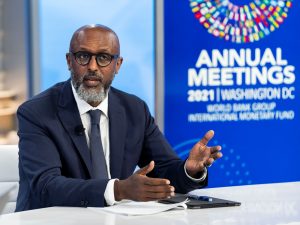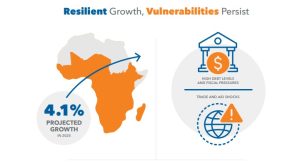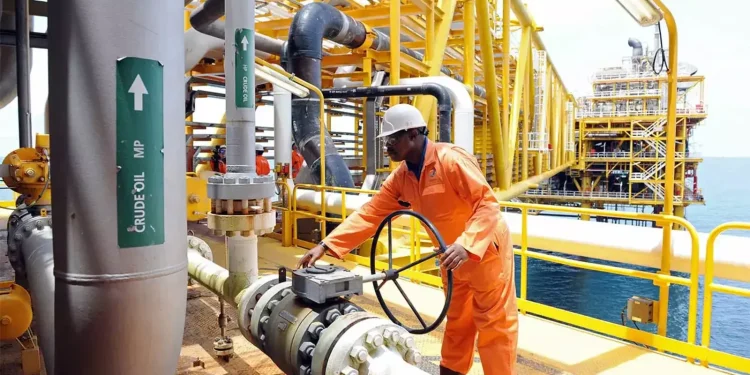Washington, D.C. — Sub-Saharan Africa’s economy is showing resilience amid global economic uncertainty, according to the International Monetary Fund’s (IMF) latest Regional Economic Outlook released in Washington, D.C., this week.
The report, titled “Holding Steady,” projects that the region’s growth will remain firm but uneven, as governments struggle with high debt costs, volatile commodity prices, and limited access to global financing.
The IMF forecasts regional growth of 4.1% in 2025, slightly higher than in 2024, signalling cautious optimism. The report highlights that although Africa’s macroeconomic recovery continues, it rests on fragile foundations that require sound fiscal discipline and sustained reform.
“Despite a challenging global environment, many African economies are showing remarkable resilience,” said Abebe Aemro Selassie, Director of the IMF’s African Department. “Inflation is declining faster than expected in several countries, and growth is beginning to recover, though the pace remains uneven.”
Resilience in East Africa
The report points to East Africa as one of the region’s bright spots, with Uganda singled out for its growth momentum driven by investment in oil and gas, agro-industrialisation, and tourism.
“We are seeing a bifurcated recovery across the region,” Mr Selassie told reporters at a press briefing. “While many countries are grappling with the pressure of rising debt service costs that crowd out essential development spending, others, particularly in East Africa, are leveraging structural changes to achieve high-potential growth.”

In Uganda’s case, the IMF projects that economic growth will accelerate as commercial oil production commences. The report noted that Uganda’s agriculture and services sectors remain strong, underpinned by improved fiscal discipline and policy reforms.
However, it cautioned that rising public debt and slow revenue mobilisation could limit long-term gains. “Uganda’s medium-term growth prospects remain positive,” the report stated, “but fiscal consolidation and domestic revenue reforms will be critical to sustain progress and reduce debt vulnerabilities.”
The Debt Challenge
A key message of the “Holding Steady” report is that Sub-Saharan African nations must expand domestic revenue sources to replace declining aid and manage growing debt obligations. The IMF warns that the median interest-to-revenue ratio now exceeds 12%, placing enormous strain on national budgets and diverting funds from essential sectors such as education, health, and infrastructure.
“Policymakers must double down on credible, transparent, and sustainable policies,” said Mr Selassie. “The foundation for long-term stability lies in broadening tax bases, streamlining inefficient tax expenditures, and strengthening enforcement via targeted compliance strategies. Protecting the most vulnerable while driving these reforms is paramount to maintaining social and political acceptability.”
The report also underscores the danger of overreliance on domestic borrowing. While local financing can reduce exposure to external shocks, it has become increasingly expensive, tightening credit conditions for the private sector and creating what the IMF calls a “bank-sovereign nexus,” where government borrowing risks crowding out private investment.
Global Context and Inflation Trends
The IMF projects that inflation across Sub-Saharan Africa will fall below 10% for the first time since 2021, driven by easing food and energy prices. This could give some central banks room to cautiously lower interest rates, though the IMF cautioned against premature policy easing or politically motivated spending ahead of elections.

The report further observes that oil-importing economies such as Kenya, Uganda, and Senegal stand to benefit from lower global energy prices and improved fiscal management, while commodity exporters like Angola and Nigeria face challenges from softening global demand and fluctuating prices.
“Global growth is slowing, and commodity markets remain volatile,” the IMF warned. “Countries with strong macroeconomic fundamentals and credible policy frameworks are benefiting more from improved financing sentiment, but risks remain high.”
Outlook and Call for Cooperation
Despite short-term challenges, the IMF maintains that the medium-term outlook is positive—if governments sustain reform momentum, strengthen governance, and boost private-sector participation.
“The world is in flux, and uncertainty has become the new normal,” said Mr Selassie. “For Sub-Saharan Africa, Holding Steady is a triumph of policy efforts thus far, but it requires continued caution, consistency, and credibility to secure the gains and truly unlock the continent’s potential for private sector-led development.”
The IMF also called for international cooperation to help African nations access concessional financing and restructure unsustainable debt. “The global community must step up,” Mr Selassie urged. “Africa’s resilience is not in question—but to unlock its full potential, the continent needs fair access to capital and markets.”
“Africa’s recovery depends on countries working together to strengthen trade integration, attract private capital, and harness technology for inclusive growth,” Mr Selassie concluded. “Resilience is not enough—we must build on it to create opportunity.”











